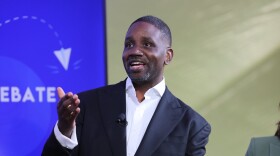Detroit voters will choose a new mayor Tuesday in the city’s first open-seat mayoral race in a dozen years.
City Council President Mary Sheffield and Triumph Church pastor Solomon Kinloch, both Democrats, will face off for the city’s top job after placing first and second in the Aug. 5 nonpartisan primary. The winner will replace outgoing three-term Mayor Mike Duggan, who is running for governor of Michigan as an independent.
The city faces a vastly different situation than it did when Duggan was first elected in 2013. In July of that year, it became the largest U.S. city ever to file for bankruptcy. The city now has a budget surplus, 12 years of balanced budgets and projected economic growth for the next five years. Homicides and violent crimes are down, while the city’s population has increased for the second consecutive year, according to the U.S. Census Bureau.
Still, the next mayor will face numerous challenges, including a shortage of affordable housing and vast economic disparities along racial lines.
Sheffield has led the field in fundraising throughout the campaign. As of the August primary, her campaign fund more than doubled that of her eight competitors combined.
In the general election, she has far outraised and outspent Kinloch. As of Oct. 19, her campaign had spent more than $1.8 million on her campaign and had roughly $772,000 in the bank. By that same point, Kinloch had spent about $160,000 on the race and had less than $11,000 remaining in the bank.
Since receiving more than 50% of the vote in the August primary, Sheffield has picked up key endorsements from Duggan, as well as from two of her former primary opponents, former city council president Saunteel Jenkins and city council member Fred Durhal. Jenkins received 16% of the primary vote, narrowly losing a spot on the general election ballot to Kinloch, who received about 17%. Durhal received about 3% of the vote.
The Detroit electorate is overwhelmingly Democratic. In the 2024 presidential election, voters in the city supported Democratic Vice President Kamala Harris over Republican Donald Trump by about a 9-1 ratio.
The election takes place as the nation’s largest cities face an unprecedented level of federal intervention, with President Trump deploying or threatening to deploy National Guard troops and federal officers to at least 10 American cities, including Los Angeles, Washington, Baltimore, Memphis, New Orleans, Chicago and Portland, Oregon, among others.
At a September rally in Howell, Michigan, Vice President JD Vance sent a public message to Democratic Gov. Gretchen Whitmer that the administration is “happy” to send the National Guard to Detroit. “All you gotta do is ask,” he said.
Like the Associated Press, Michigan Public does not make projections and will declare a winner only when it’s determined there is no scenario that would allow the trailing candidates to close the gap. If a race has not been called, the Michigan Public will continue to cover any newsworthy developments, such as candidate concessions or declarations of victory.
Michigan’s mandatory recount law does not apply to Detroit’s mayoral race. Instead, candidates may request and pay for a recount, with the payment refunded if the recount changes the outcome. The AP may declare a winner in a race that is subject to a recount if it can determine the lead is too large for a recount or legal challenge to change the outcome.
Here’s a look at what to expect on Tuesday:
How late are polls open?
Polls close at 8 p.m. ET.
Who gets to vote?
Any voter registered in Detroit may participate in the mayoral general election.
What do turnout and advance vote look like?
There were more than 518,000 registered voters in Detroit as of the August mayoral primary.
Turnout in that primary was about 17% of registered voters. About 32% of mayoral primary voters cast their ballots in person, while the remaining 68% voted early in person or by absentee ballot.
Turnout in the 2021 mayoral general election was about 19% of registered voters, with about 67% of voters casting early or absentee ballots.
As of Monday, nearly 45,000 ballots had been cast in Detroit before Election Day.
Are we there yet?
As of Tuesday, there will be 364 days until the 2026 midterm elections and 1,099 days until the 2028 general election.





